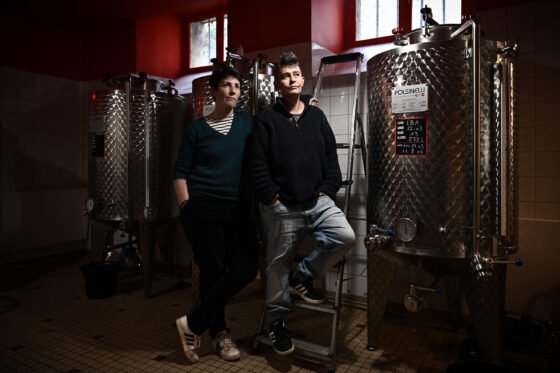
When Véronique and Véronique started brewing beer, they thought they were turning a world of very masculine brewers upside down. But after some research, these two enthusiasts discovered that the origin of their profession was much more feminine than we think. From ancient times to the Middle Ages, women brewed and sold beer before being completely banned from these professions during the Industrial Revolution. But today they come back into effect.
“Beer in the collective imagination is rather a drink for men (…), which we strongly refute”launches laughing Véronique Verisson, 49, co-founder of Y’a Une Sorcière Dans Ma Bière, a small brewery in the town of La Réole, in southwestern France. “We’re just two women who loved beer and wanted to do something ourselves”adds his partner Véronique Lanceron, 44 years old.
From the outset, the company of those who are nicknamed “Véro en Véro” by everyone here was categorically feminist: the word is on their business card. But when they begin their research into the beer world, they discover that they belong to an age-old tradition as brewers.
Brewing beer, a women’s story
The first recipe mentioned is written on a piece of clay from 1800 BC, as an ode to Ninkasi, the Sumerian goddess of beer. At the same time, in Mesopotamia, the Code of Hammurabi, which contains the oldest known laws, including various rules for brewers and innkeepers, always refers to a “she”.
Brewing beer remained a women’s business throughout the Middle Ages, when low-alcohol beer was considered nutritious for the whole family. Since the drink could not be stored at the time, the women sold the surplus to the neighbors, which gave them a certain financial independence and allowed some of them to open their own taverns. But as beer becomes a lucrative business, men are taking more control of the industry.
An industrial revolution that rhymes with exclusion
Beginning in the 13th century, the Catholic Church declared that brewers were amoral and unclean temptresses, an argument adopted by the monks who took over the reins of brewing in their abbeys.“As long as it makes money, guys” are more interested in it, says journalist Anaïs LeCoq, who returns to this story in her book “Maltriarcat”.“The final blow was to kick women out of breweries”she continues.
Production was mechanized during the industrial revolution. Neither have “access to capital, neither to property, nor to higher education”the women “disappear from the box”†
“There is no man’s drink and woman’s drink”
Things have changed dramatically with the recent spate of craft beer and micro-breweries, many of which are run by women.“We see that many young people are interested in our beer and it is not surprising that we are two brewers”, says Veronique Verisson. On the contrary, “There are many things to explain” for an older audience.
They find the advertisements of major beer brands heartbreaking, with half-naked women and football as their main marketing strategy. “It’s the same with ghosts. I like whiskey, but in my head it’s always categorized as a man’s drink”confides in the brewer.“There is no man’s drink and woman’s drink”she adds. “There are plenty of men who feel debilitated when they are told they drink the same as women. It’s completely stupid… and annoying.”
(AFP)